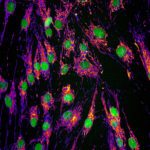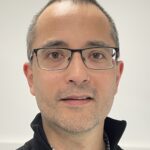Link to Pubmed [PMID] – 16765077
Mol. Genet. Metab. 2006 Sep-Oct;89(1-2):129-33
Mutations in SCO2, a metallochaperone involved in mitochondrial copper delivery, are associated with early onset, fatal hypertrophic cardiomyopathy. All reported patients carry at least one copy of the common 1541G>A (E140K) mutation. Whereas patients with one copy of the E140K allele, in combination with a more deleterious mutation, follow a severe clinical course, patients homozygous for the E140K mutation have a delayed onset of disease and a more prolonged survival. Here, we have investigated a patient who appeared homozygous for the common 1541G>A mutation based on DNA sequencing and restriction enzyme analysis of a PCR product, yet presented with early onset, severe cardiomyopathy. Restriction enzyme analysis of parental DNA revealed that the mother was heterozygous for 1541G>A, while the father was homozygous wild-type. The patient showed biparental inheritance for microsatellite markers spanning the length of chromosome 22, making isodisomy unlikely. Sequencing of several single nucleotide polymorphisms within the 5′-UTR, intron and single exon of the SCO2 gene was uninformative; however, a 16 bp deletion within the intron was present in the patient and the mother, but not the father. Restriction enzyme analysis confirmed that the mother was heterozygous and that the patient was hemizygous for the deletion. Southern blot, Northern blot, and FISH analyses were consistent with the de novo deletion of one allele of SCO2 in the patient. This is the first report of hemizygosity in a SCO2 patient. The patient phenotype underscores the strikingly similar clinical course in all patients with one copy of the E140K allele. Examination of both patient and parental genotypes by thorough molecular analyses can reveal information with important implications for genetic counseling.

